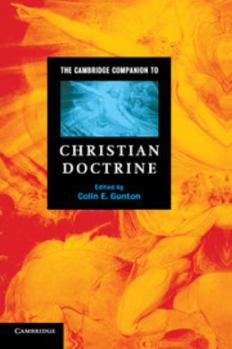The Cambridge Companion to Christian Doctrine
(Part of the Cambridge Companions to Religion Series)
Select Format
Select Condition 
Book Overview
What is Christian doctrine? The fourteen specially commissioned essays in this book serve to give an answer to many aspects of that question. Written by leading theologians from America and Britain, the essays place doctrine in its setting - what it has been historically, and how it relates to other forms of culture - and outline central features of its content. They attempt to answer questions such as 'what has, and does, Christian doctrine teach about God, the creation, the human condition and human behaviour?' and 'what is the part played in Christian doctrine by the Trinity, Jesus Christ and the Holy Spirit?' New readers will find this an accessible and stimulating introduction to the main themes of Christian doctrine, while advanced students will find a useful summary of recent developments which demonstrates the variety, coherence and intellectual vitality of contemporary Christian thought.
Format:Paperback
Language:English
ISBN:052147695X
ISBN13:9780521476959
Release Date:June 1997
Publisher:Cambridge University Press
Length:328 Pages
Weight:1.07 lbs.
Dimensions:0.7" x 6.0" x 8.9"
Customer Reviews
2 ratings
New wine, new wineskins
Published by Thriftbooks.com User , 20 years ago
An earlier, self-described "very conservative evangelical" reviewer criticized the essays in this collection for their "questionable" liberal conclusions. It's curious how different people can read the same text and arrive at different conclusions. My own reading of this anthology is that the essays strive (perhaps overly much, in fact) to stay in the middle of the road. Few people would describe Robert Jenson or Stanley Hauerwas, two of the contributors, as "liberal" theologians. They're certainly adventurous and prophetic, but also utterly orthodox (this isn't meant, by the way, as criticism).Perhaps what displeased the earlier reviewer is this: _The Cambridge Companion to Christian Doctrine_ takes as its working assumption the need of doctrinal theology to walk a fine line between remaining loyal to tradition on the one hand and re-thinking that tradition in light of each new generation's experience on the other. In the West, we've moved out of the modern into the postmodern era. Modernist modes of interpreting Christian doctrine cry to be replaced with newer ones that reflect the new postmodern ethos. Otherwise, the Good News runs the risk of coming across as increasingly irrelevant to too many people. The contributors to this volume aim to read traditional doctrine against this new background.The essays are divided into two sections. The first deals with the nature and scope of doctrinal theology and its relationship to nonChristian traditions (Judaism) and the symbols of secular society (the arts). The second examines several key topics traditionally included in doctrinal or systematic theology: the trinity, creation, anthropology, sacraments, Christology, pneumatology, eschatology. Geoffrey Wainwright's essay on "The Holy Spirit" is especially noteworthy. Perhaps the single best essay in the entire collection, it seeks to reawaken the West to theological reflection on the Holy Spirit without falling victim to a "pneumatological hypertrophy" characteristic of, for example, Pentecostalism (p. 289). Equally worthy of note is Gerard Loughlin's "The Basis and Authority of Doctrine," which attempts a postmodern reading of that most un-postmodern of doctrines: authority. But although of varying quality, none of the articles in the collection are heavy-handed or simplistic. There are certain gaps in the collection--the editor himself seems uncomfortable that no essay explicitly dealing with the topics of justification and sanctification is included, and on a related note, I worry about the lack of a sustained treatment of grace. But all in all, a good, through-provoking anthology.
An outstanding collection
Published by Thriftbooks.com User , 22 years ago
Simply put, The Cambridge Companion to Christian Doctrine is an outstanding collection of essays by leading theologians and serves well as an introduction to contemporary trends in Christian theology. The authors are generally more conservative--postliberal or evangelical--and offer stimulating constructive and historical essays regarding Christian theology in general and the traditional doctrines. I use the text in a graduate level intro. course to compliment another standard text in systematic theology, giving the student another brief perspective on contemporary Christian theology. Readers with some background in philosophy or theology will find it extremely useful, but those with no philosophical or theological background may be a little overwhelmed (consider Alister McGrath's "Christian Theology: An Introduction" instead).






